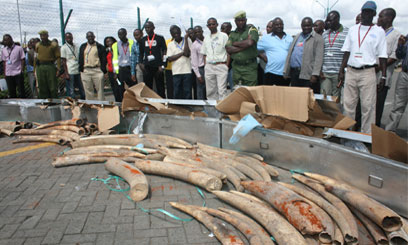NAIROBI, Kenya, Jul 19 – Officials have raised concerns over widespread illegal poaching in Africa despite the existence of laws prohibiting it.
The Lusaka Agreement Taskforce which is charged with helping African law enforcement agencies tackle wildlife smuggling said on Monday that illegal ivory trade remained a major challenge for the taskforce.
Speaking during the inauguration of African Elephant Law enforcement day, Director Bonaventure Ebayi revealed that in the last five years, more than 50 tonnes of elephant ivory had been seized originating from the region.
“Elephant poaching and illegal trade in ivory is exacerbated by inadequate funding and most countries especially the Lusaka Agreement member states are grappling with the challenge of mobilising adequate financial resources to combat illegal wildlife trade,” he noted.
Forestry and Wildlife Minister Noah Wekesa said they were in the process of reviewing the law on wildlife to have stringent penalties for poachers.
“Illegal poachers are getting away very easily. The law that has existed has been very lenient to these fellows. In the current draft Bill, we have strengthened the punishment,” Dr Wekesa said.
On Wednesday, Kenya is expected to burn nearly five tonnes of elephant tusks seized in Singapore in 2002 and brought to Kenya by the Lusaka Agreement Taskforce – which is headquartered in Kenya -in 2004 for investigation purposes.
President Mwai Kibaki is expected to lead the exercise that will take place at the Kenya Wildlife field training school in Manyani, Tsavo West National Park.
Kenya Wildlife Service Director Julius Kipng’etich termed the event as a major statement by the Lusaka Agreement member states that poaching would not be condoned.
“It also sends a message that nobody should benefit from criminal activities,” he stated.
“There is pressure for consumption either legally or illegally of wildlife products in the world and the human population is increasing rapidly and the consequences will be incredible,” the KWS boss noted.
The Lusaka Agreement on Cooperative Enforcement Operations Directed at Illegal Trade in Wild Fauna and Flora was adopted in September 1994 and currently there are seven parties to the agreement. These are the Republics of Congo Brazzaville, Kenya, Tanzania, Uganda, Zambia, Liberia and Lesotho.
South Africa, Ethiopia and Swaziland are signatories.












































